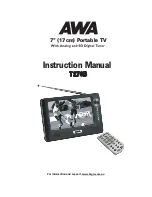
3
STARTING
1. Check oil level and fuel.
2. Remove all electrical loads from the
generator.
3. Set the switch to the ON position.
4. Move the choke/run switch to the
choke position.
5. Pull the starter rope with a brisk
smooth motion.
6. Move the choke/run switch to the
run position.
7. After each start up, allow engine to
run 2-3 minutes with no load.
Engine speed is
preset to provide
proper output voltage. Never attempt to
modify or adjust engine speed or output
voltage.
ENGINE BREAK-IN
After initial start-up, the engine should
be broken in according to the
manufacturer’s instructions. Refer to the
engine manual for the proper break-in
procedure.
GENERATOR SHUT OFF
1. Remove all electrical load devices
from the generator.
2. Allow the engine to run for 2-3
minutes with no electrical loads.
3. Set the switch to the OFF position.
This will stall the engine.
!
CAUTION
4. Verify that the generator has
completely stopped.
5. Allow the unit to cool before
installing any covers.
LOAD DEVICES
1. The
120 volt receptacles
are rated
for 15 amps.
2. Total combined load through any
combination of receptacles must not
exceed the rated load limits of the
generator.
NOTE:
Power draw can be calculated
by multiplying volts and amps. The
resulting number is wattage.
Never exceed the posted maximum
wattage for the generator or any
individual receptacle. Refer to owner's
manuals and product tags to determine
the wattage of electrical load devices.
Long power cords and extension cords
draw additional power. Keep cords at
minimum possible length.
Precautions must be taken to prevent
electrical back feeding into utility
systems. This requires isolation of the
electrical system. To isolate the electrical
system, perform the following
procedures:
1. Turn off the main electrical system
switch prior to connecting the
generator.
2. In accordance with national and local
standards, a double throw transfer
switch must be installed in the
system.
Always shut off
main power prior
to temporary connection of the
generator to a building electrical
system.
Installation of the
generator as a
backup electrical source must be
performed by a qualified (licensed or
certified) electrical technician.
!
WARNING
!
WARNING
2.5
300
600
1000
600
375
250
5
600
1200
500
300
200
125
7.5
900
1800
350
200
125
100
10
1200
2400
250
150
100
50
15
1800
3600
150
100
65
20
2400
4800
175 125
75
50
25
3000
6000
150
100
60
30
3600
7200
125
65
40
4800
9600
90
Amps
Watts
Watts
#8
#10
#12
#14
#16
120 V
240 V
Wire
Wire
Wire
Wire
Wire
EXTENSION CORDS
MAXIMUM RECOMMENDED LENGTHS (IN FEET)
Operation (Continued)
Air conditioner
2000-3000
Automatic washer
150-1500
Brooder
100+
Clothes dryer
5000-10,000
Coffee maker
400-700
Electric drill (small)
225-1000
Electric drill (large)
500-1000
Fan
40-200
Freezer
300-500
Hot plate
330-1100
Iron
500-1500
Light bulb
As Rated
Load Device
Watts
Load Device
Watts
Radio
50-200
Refrigerator
190-2000
Skillet
1200
Space heater
600-4800
Sump pump
400-3000
Television
200-500
Toaster
900-1700
Vacuum cleaner
200-300
Water pump
1000-3000
Water heater
1000-5000
Small hand saw
1000-2000
Large hand saw
1500-2500
ESTIMATED POWER USAGE (WATTS)
Installation for
Stand-by Use
www.chpower.com



































